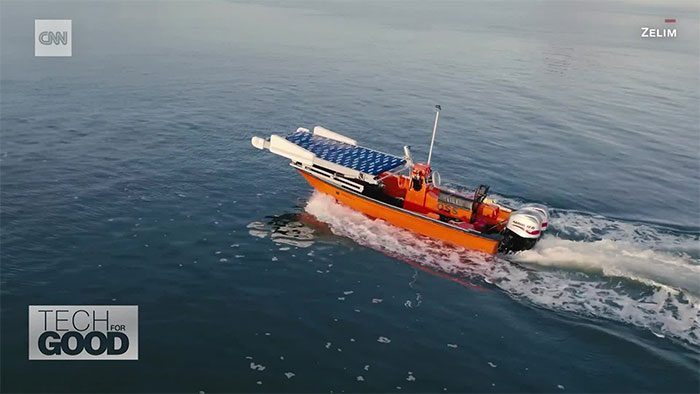Startup Scotland is developing an automated rescue boat named Guardian, equipped with an AI victim detection system and a conveyor belt to lift people out of the water.
As the number of offshore wind farms and oil rigs increases, working in these remote infrastructures poses significant risks. Zelim, a startup founded in Scotland by sailor Sam Mayall in 2017, leverages artificial intelligence and smart technology to enhance maritime safety. Zelim is currently developing the automated rescue boat called Guardian, as reported by CNN on November 13. The company is collaborating with the U.S. Coast Guard and several offshore energy companies to refine the technology.
(Video: CNN).
Guardian integrates an AI victim detection system and a Swift conveyor belt to swiftly retrieve individuals from the water. The boat features a two-way communication system, allowing rescued victims to communicate with medical teams remotely and receive first aid instructions. Mayall noted that Guardian can be deployed from offshore facilities where personnel are often scarce, making it challenging to call emergency rescue teams due to many accidents occurring hours away from the rescue boat.
Guardian is still in development, but Zelim’s victim detection technology and conveyor belt have already been tested. In 2017, when Zelim was newly established, Mayall’s team researched ways to detect individuals in turbulent waters under severe weather conditions. They developed an AI software program capable of utilizing data from image sources like drones or surveillance cameras. Using data provided by the U.S. Coast Guard, Zelim’s machine learning model was trained on over 5 million images of real people underwater, achieving a detection accuracy of 90%.
Detecting individuals is just one part of the search and rescue process. Quickly getting them out of the water is equally crucial. Cold shock can occur within three minutes, potentially leading to hyperventilation, restricted blood circulation, and eventually hypothermia. According to a report from the Marine Accident Investigation Branch, on average, victims become unresponsive within 11 minutes of entering cold water.

Prototype of the Guardian rescue boat equipped with the Swift conveyor.
Zelim’s Swift conveyor is designed to adapt to marine environments, allowing for rapid retrieval of individuals from the water, in just about 30 seconds. The Swift system is currently being tested, with the Milford Haven Port Authority (MHPA) also participating in the support.
“We are very impressed by the simplicity of the new design,” said Gareth Phillips, project manager at MHPA. According to Phillips, Swift is easy to use, maintain, and service, making it potentially beneficial in various locations, including ports and offshore wind farms.
MHPA plans to install Swift on one of the company’s pilot boats, which are tasked with guiding large vessels in and out of the port. The cost of Swift is comparable to other safety equipment expenses, Phillips mentioned. If the trials are successful, MHPA will roll out the system across its entire fleet of pilot boats.




















































